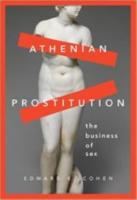
OUP (2016) h/b 243pp £47.99 (ISBN 9780190275921)
‘There was no legal prohibition against providing sex for cash’ (p. 115). Such a straightforward statement simplifies an extremely complex social and legal arrangement.
C. is a highly regarded scholar specializing in the subjects of economics, commerce and legal matters. In the book under review he has turned his penetrating eye on his clever subtitle The business of sex, set in the context of social and economic history. Naturally, the centre of the study is classical Athens, as only Athens provides us with the necessary material, mainly 4th century oratory and philosophy, alongside 5th and 4th century tragedy and comedy (including their Roman adaptations) assisted by later quotations in Athenaeus and such. The footnotes print many of the Greek texts that are quoted—a great help as the range of authors is so wide. Material remains (pp. 20-24), such as Bau Z in the Athenian Kerameikos and the images on figured pottery, play a minor role.
One of the main complications the author has had to face concerns language—he points out on p. 31, note 43 that there are at least 200 words, ‘at different registers of usage, relating to venal sexual exchange.’ Add to this the pricing process of transactions and the inevitable tendency for clients and providers to lie about the costs of any encounter, as well as the difficulty of knowing how truthful the forensic speeches themselves were.
C. also has to wrestle with the social strata—citizens, non-citizens, prosperous slaves, and with the wide range from the high-class hêtairos(a) to the street pornos(ê). The well-paid mesdames whom we know by name—Lais, Phryne, Glykera, etc.—contrast with the general run of bawds, and recent work on Neaira and her ‘family’ has shown what a complex business prostitution could be. Elite values ran up against the realities of practical life. Salaried employment was disdained, but gift-giving instead of payment freed the prostitute from social stigma, so commercial trading became a liberal transaction.
C.’s investigations show how pimping, so difficult to define, could lead to the death penalty. He explains that there was ‘whoring under contract’, that slaves had access to the courts, that foreigners who spoke no Greek were represented by Greek speakers, that women had widespread involvement in business, especially the business of sex, as it was hard for citizen men to engage in commercial pursuits.
The seven crisp chapters, densely packed with facts and figures, reveal the varied and sometimes contradictory picture of sexual commerce. For a detailed text such as this the proof-reading is excellent, but I was saddened to see that Sir John Beazley was misspelt as Beasley (pp. 21 and 182).
Brian A. Sparkes
